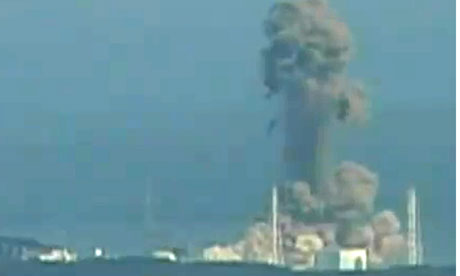Japan radiation leaks feared as nuclear experts point to possible cover-up
Lack of radiation readings echoes pattern of secrecy employed after other major accidents such as Chernobyl

Nuclear experts have thrown doubt on the accuracy of official information issued about the Fukushima nuclear accident, saying that it followed a pattern of secrecy and cover-ups employed in other nuclear accidents. "It's impossible to get any radiation readings," said John Large, an independent nuclear engineer who has worked for the UK government and been commissioned to report on the accident for Greenpeace International.
"The actions of the Japanese government are completely contrary to their words. They have evacuated 180,000 people but say there is no radiation. They are certain to have readings but we are being told nothing." He said a radiation release was suspected "but at the moment it is impossible to know. It was the same at Chernobyl, where they said there was a bit of a problem and only later did the full extent emerge."
According to some reports, 17 helicopter crewmen helping in rescue efforts were contaminated with low-level radiation, but Japanese officials declined to comment.
The country's government has previously been accused of covering up nuclear accidents and hampering the development of alternative energy.
In a newly released diplomatic cable obtained by WikiLeaks, politician Taro Kono, a high-profile member of Japan's lower house, tells US diplomats that the Ministry of Economy, Trade and Industry – the Japanese government department responsible for nuclear energy – has been "covering up nuclear accidents and obscuring the true costs and problems associated with the nuclear industry".
In 2008, Kono told them: "The ministries were trapped in their policies, as officials inherited policies from people more senior to them, which they could then not challenge." He mentioned the dangers of natural disasters in the context of nuclear waste disposal, citing Japan's "extensive seismic activity, and abundant groundwater, and [he] questioned if there really was a safe place to store nuclear waste in the 'land of volcanoes'."
"What we are seeing follows a clear pattern of secrecy and denial," said Paul Dorfman, co-secretary to the Committee Examining Radiation Risks from Internal Emitters, a UK government advisory committee disbanded in 2004.
"The Japanese government has always tended to underplay accidents. At the moment the Japanese claims of safety are not to be believed by anyone. The health effects of what has happened so far are imponderable. The reality is we just do not know. There is profound uncertainty about the impact of the accident."
The Japanese authorities and nuclear companies have been implicated in a series of cover-ups. In 1995, reports of a sodium leak and fire at Japan's Monju fast breeder reactor were suppressed and employees were gagged. In 2002, the chairman and four executives of Tepco, the company which owns the stricken Fukushima plant, resigned after reports that safety records were falsified.
No comments:
Post a Comment